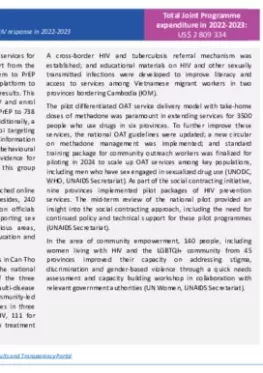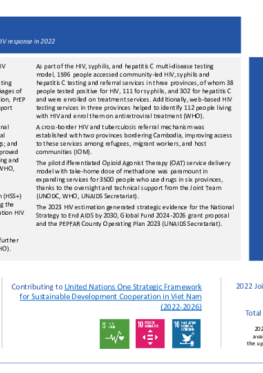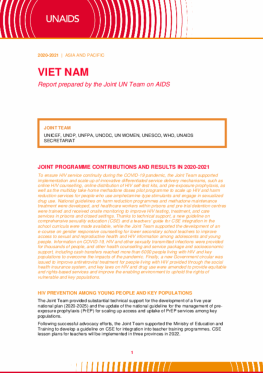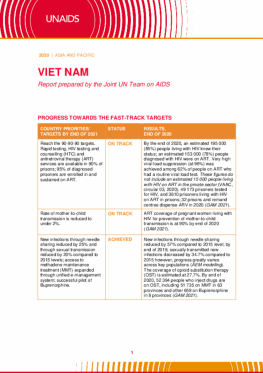|
Viet Nam
Viet Nam continued to scale up HIV and harm reduction services for vulnerable and key populations through critical support from the Joint Programme. For instance, a digital referral system to PrEP services was added to the web-based HIV self-testing platform to ensure easy access for people with non-reactive HIV test results. This platform helped to identify 105 people living with HIV and enrol them on treatment. It also facilitated the provision of PrEP to 738 people at risk of infection (WHO, UNAIDS Secretariat). Additionally, a pilot HIV sentinel surveillance system (HSS+) in Ha Noi targeting transgender women helped to generate strategic information including population size estimates, HIV prevalence and behavioural information, thus improving the data availability and evidence for tailored combination HIV prevention services among this group (UNAIDS Secretariat).
In 2023, a total of 3250 students completed a newly launched online course on comprehensive sexuality education (CSE). Besides, 240 provincial and national trainers, health and education officials working with young people and young educators supporting sex workers improved their professional capacity in various areas, including delivery of CSE, HIV prevention, life skill education and training (UNFPA, UNESCO, UNAIDS Secretariat).
Access and quality of HIV, syphilis and hepatitis C services in Can Tho province improved following the implementation of the national action plan on elimination of vertical transmission of the three diseases. As part of the HIV, syphilis, and hepatitis C multi-disease testing model, close to 1600 people also accessed community-led HIV, syphilis and hepatitis C testing and referral services in three provinces, of whom 38 people tested positive for HIV, 111 for syphilis, and 302 for hepatitis C and were enrolled on treatment services (WHO).
A cross-border HIV and tuberculosis referral mechanism was established; and educational materials on HIV and other sexually transmitted infections were developed to improve literacy and access to services among Vietnamese migrant workers in two provinces bordering Cambodia (IOM).
The pilot differentiated OAT service delivery model with take-home doses of methadone was paramount in extending services for 3500 people who use drugs in six provinces. To further improve these services, the national OAT guidelines were updated; a new circular on methadone management was implemented; and standard training package for community outreach workers was finalized for piloting in 2024 to scale up OAT services among key populations, including men who have sex engaged in sexualized drug use (UNODC, WHO, UNAIDS Secretariat). As part of the social contracting initiative, nine provinces implemented pilot packages of HIV prevention services. The mid-term review of the national pilot provided an insight into the social contracting approach, including the need for continued policy and technical support for these pilot programmes (UNAIDS Secretariat).
In the area of community empowerment, 140 people, including women living with HIV and the LGBTQI+ community from 45 provinces improved their capacity on addressing stigma, discrimination and gender-based violence through a quick needs assessment and capacity building workshop in collaboration with relevant government authorities (UN Women, UNAIDS Secretariat).





